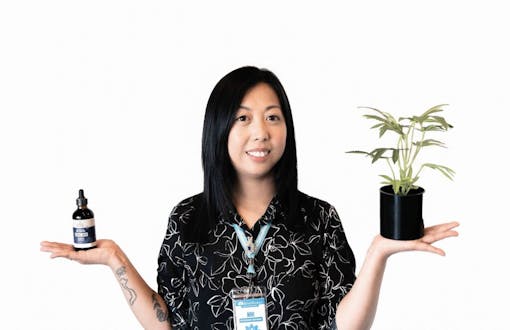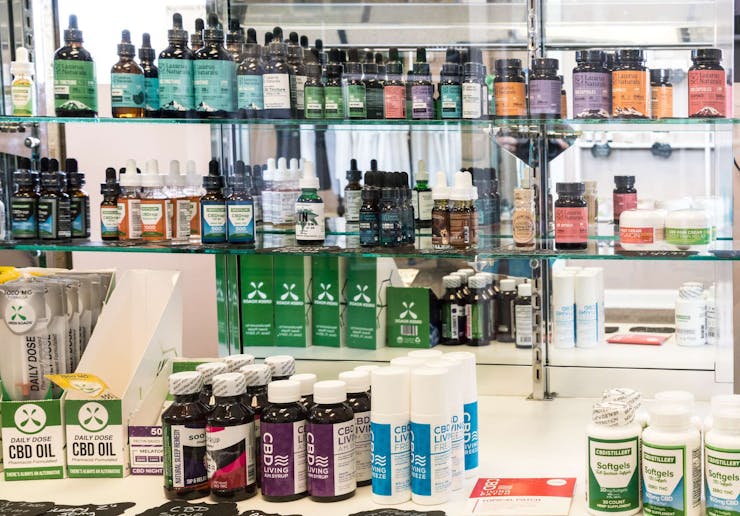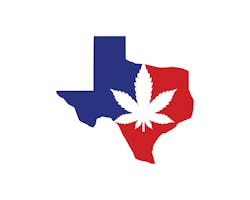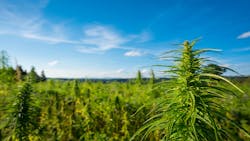Just a few short years ago, some insiders argued that the nascent CBD industry was on a fast track to becoming a lucrative powerhouse.
It has not, however, lived up to that expectation. In fact, in the past few years, the market has shrunk dramatically.
A handful of interconnected factors have contributed to the CBD nosedive. Hemp acreage has plummeted. The FDA—some insiders contest—has stifled the industry by not establishing guidelines for CBD that would encourage more investment and manufacturing. The rise of delta-8 and other psychoactive hemp-derived cannabinoids has arguably siphoned off potential CBD customers, offering an experience closer to conventional cannabis.
Yet while CBD may be down, experts and business owners attest that it’s far from out. Insiders point to several reasons to be hopeful: a stabilizing market, a rise in consumer education, the disappearance of subpar products, and the chance for Congress to improve the situation.
Read on to learn more about the challenges facing CBD, which products continue to sell, and the opportunities that lie ahead.
After a big start, a big slump

Before we jump into the state of the CBD market, let’s refresh ourselves on how we got here.
The prohibition of hemp began to thaw during the Obama Administration with the passage of a Farm Bill in 2014. The legislation permitted states to launch pilot programs for growing hemp.
The CBD floodgates fully opened a few years later when then-President Donald Trump signed the 2018 Farm Bill into law. That bill legalized the growing and manufacturing of hemp products across the US, as long as they contain less than 0.3% THC.
“The acreage just started growing from 2014 all the way through 2019. And by the time we got to 2019, we had registered like 550,000 acres [of hemp],” the veteran hemp entrepreneur Morris Beegle, told Leafly. Beegle is the Co-founder and President of the We Are For Better Alternatives (WAFBA) family of brands, which includes the annual NoCo Hemp Expo.
Manufacturers could extract CBD from that raw hemp and infuse it into consumer products such as gummies, tinctures, infused beverages, and others. (Raw hemp can also be used as biofuel, building materials, and clothing materials, among other applications.) Customers saw a range of novelty CBD products too: Toothpicks, pillows, and bike shorts, just to name a few.
Yet the surge in hemp production created an imbalance between supply and demand.
“For where the market was and the demand of the market, it was just way too much material. All of a sudden we’re over capacity with extraction and being able to process it, and all of a sudden everybody’s got CBD isolate, they’ve got distillate, they’ve got biomass and the price basically craters,” Beegle explained.
Shop highly rated dispensaries near you
Showing you dispensaries nearHe added that the price of CBD isolate has lost nearly all of its value in the past few years. “At one point it was $18,000 for a kilo. Now it’s down to 200 bucks.”
Prices of products plummeted as well. According to Brightfield, a cannabis analytics firm, prices for CBD products declined by 40-50% in 2019 and 2020.
Many businesses couldn’t stay afloat. “We had 4,000 or 4,500 brands going into 2020, and I heard last year there were about 1,500 brands. And then there’s still going to be a lot more thinning of the herd,” Beegle added.
Beegle believes that hemp acreage has also hit rock bottom recently, totalling roughly 20,000 acres.
Poor products and delta-8 impact the CBD game
Marcus Quinn, CEO of SunMed CBD / Your CBD Store, explained that the years following the passage of the 2018 Farm Bill saw a rise in poor-quality products that may have turned potential customers off to CBD.
“There were so many people, so many companies [and a lot of] subpar products. Those got into people’s hands and then those people were disenchanted from [using CBD],” Quinn told Leafly.
The 2018 Farm Bill also made it legally possible for manufacturers to convert hemp into a range of novel psychoactive cannabinoids like delta-8, hemp-derived delta-9 THC, HHC, and more. These products offer a psychoactive experience more akin to THC, potentially luring away customers who would have otherwise purchased CBD products.
Delta-8 “definitely siphoned off a lot of CBD sales,” said Nhi Kha, who runs a hemp dispensary called Sativa Remedy outside of Buffalo, New York. She estimates that psychoactive products—which at her store are limited to hemp-derived Delta-9 THC—constitute half of her sales.
Quinn estimates that these psychoactive cannabinoids add up to a large portion of his sales, too—about 30%.

Is the FDA also responsible for the weak market?
According to Beegle and other industry insiders, the Food and Drug Administration (FDA) has played a role in stifling the CBD market as well.
Following the passage of the 2018 Farm Bill, then-FDA Commissioner Scott Gottlieb announced that his agency would “clarify its regulatory authority over these products.” The agency began researching CBD in order to establish a regulatory framework.
This January, four years later, the agency announced that it would pass the job on to Congress.
“The FDA has not done what Congress assigned them to do through the Farm Bill, and that is to regulate CBD as a dietary supplement,” Beegle told Leafly.
Beegle argues that the lack of regulatory clarity has had enormous implications for potential investors.
“You’ve got big retailers like Whole Foods, Krogers, Safeway, Walgreens, as yet to say [they’re] going to bring in ingestible CBD products because the FDA hasn’t regulated it,” he said.
“Coca-Cola and Pepsi and Nestle, all the big food and beverage brands, and even big supplement brands, have stayed on the sidelines for the most part. Investment money is like, ‘We tried to put in money because we thought they were going to regulate this,’” he added.
Some insiders, however, have more faith in Congress than the FDA to get the job done.
“We’re supportive of the FDA’s decision to move it over to Congress. We think that we’ll have a better shot of getting a clearer pathway through legislation than through the [FDA],” said Marcus Quinn of Your CBD Store.
The market has begun to stabilize
Despite dire data points and a fragile regulatory situation, many argue that the CBD market has begun to grow again.
Back in 2018, Brightfield, the analytics firm, estimated that the hemp CBD industry would be worth $22 billion by 2022. Beegle estimates the industry is currently worth between five and six billion in a 2023 report.
“I think that we’ve bottomed out, and I think that the CBD market has stabilized,” he said.
“Our company has experienced a similar pattern,” added Quinn. “It does seem that awareness is up and our customer retention is growing. I think that we definitely are set to get back to those 2019 levels.”
Kha from hemp dispensary Sativa Remedy also believes that the industry has begun to stabilize, and that recreational cannabis legalization in New York has actually brought more customers back to CBD.
“A lot of my customers say, ‘the weed out there is not like the weed I smoked back in the day,’” Kha told Leafly in a phone interview, as her shop’s door chimed every couple of minutes in the background. “I’ve seen increased sales in my CBD flowers because more folks are utilizing it, maybe to mix with their higher THC. More folks are recognizing [that they] can use high CBD during the daytime to function.”
Goodbye, novelty CBD products!
Not all form factors have fared equally as the market has rebounded. Both Quinn and Kha said that gummies fly off their shelves. Kha noted that beverages are a close second. Quinn said that his top-selling item is a topical for pain relief, and that tinctures used to be more popular.
Ben Starmer is the co-founder of the buzzy—and Leafly-endorsed—CBD brand Dad Grass, which sells a line of CBD products including pre-rolls, gummies, and tinctures. He’s seen rising interest in CBD flower among customers.
“For us, the biggest change would be the increased awareness of smokable CBD as a new way to consume cannabis/CBD,” he said. “When we started, so much of what we did was education… Now the term ‘CBD joints’ is much more known, which has been a delight to see,” Starmer added.
None of the business owners I spoke to for this story spilled any tears over the disappearance of novelty products from the market.
“Looking back to 2019, CBD was positioned in many places as a cure-all for pretty much everything,” said Starmer. “So, collectively, we were seeing bad expressions of CBD in everything from gas station gummies to shampoo to candles.”

“Consumers couldn’t differentiate between high quality products with sufficient amounts of active ingredients in the proper format… and something that may not even have any CBD in it. Thankfully, we’ve seen most of those products go by the wayside,” he explained.
“The consumers are getting smarter,” added Kha. “It’s been five years since CBD has been on the marketplace, and I think consumers are now being more intentional with their purchases,” she said.
What’s next for CBD?
The CBD industry could get another jolt later this year via a revised Farm Bill. The bill expires—and thus must be updated—every five years, and the 2023 bill could potentially include a wider regulatory framework for CBD that helps the industry grow.
Beegle, for one, believes the industry will continue to rebound regardless. The question is just whether that growth will be incremental, or drastic.
“If [the industry] is like it is right now where we really don’t have any regulations and it’s just still gray, I think that we’ll continue to increase slowly. But if the FDA does put out a regulatory process or Congress does, and everybody’s like, ‘all right, now we know what the rules are and let’s play within the rules,’ then you’ll see things start to increase by 10 or 12 or 15% annually for a period of time.”





